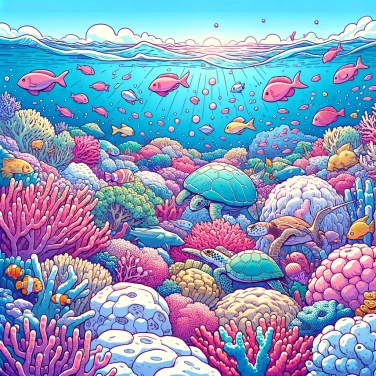Coral reefs are important for marine ecosystems as they provide a crucial habitat for many marine species, promote biodiversity, and help protect coastlines against erosion.

Corals form reefs that serve as true homes for countless marine species. A quarter of all marine biodiversity directly depends on these reefs, finding refuge, food, and breeding grounds there. Fish, mollusks, crustaceans, as well as certain turtles and sharks, benefit daily from these structures. Coral reefs act like real underwater cities, bustling with life, where each species has its role. Their presence is crucial: without them, the entire local marine balance would be disrupted with the loss of many species.
Coral reefs act as a true natural barrier against large waves, storms, and even tsunamis. Thanks to their solid structures, they dampen the energy of the waves and reduce their impact, thereby preventing too rapid coastal erosion. They directly protect the residents living on the coasts by preventing their homes from being swept away or damaged. Without corals, we would lose this natural defense, forcing us to build very expensive and often less effective artificial barriers.
Coral reefs are home to many marine species important for both commercial and artisanal fishing. A large part of the populations in coastal areas directly depends on resources from corals for their daily livelihood. By attracting massive tourism around diving, snorkeling, and water activities, corals also contribute significantly to local economic income. It is estimated that millions of people worldwide live directly or indirectly thanks to coral reefs, whether for food, jobs, or tourist revenue.
Corals play an essential role in climate regulation because they actively participate in carbon storage. They capture a large amount of CO₂ present in the water and atmosphere, which they then incorporate into their calcium carbonate skeleton. This mechanism acts like a true natural carbon sink that effectively limits the concentration of greenhouse gases. Without the discreet yet effective work done by these reefs, more CO₂ would be free in the atmosphere, further amplifying global warming. Additionally, their chemical exchanges with the ocean stabilize the chemical composition of the water, thus helping to maintain the stable temperatures and conditions necessary for marine life. Corals are therefore, in a way, small underwater climate power plants—perhaps discreet, but absolutely essential.
Corals produce unique chemical compounds that are used to develop medications capable of treating certain human diseases. Yes, yes, these strange organisms at the bottom of the ocean can help combat serious issues like cancer, bacterial infections, or even viral ones. Scientists are constantly studying these corals to discover new molecules or chemical substances. It’s a bit like an underwater natural pharmacy still full of surprises. In short, preserving corals is also about keeping potential incredible medical solutions within reach for the future.
Coral bleaching is a phenomenon linked to environmental stress (temperature changes, ocean acidification), during which corals expel their precious algae and lose their coloration, potentially leading to their death in the long run.
Coral reefs, although they make up less than 1% of the ocean floor, are home to about 25% of all known marine species.
Some corals produce chemical compounds that are used in the manufacture of medications to fight diseases such as cancer, arthritis, and microbial infections.
The Australian Great Barrier Reef is visible from space and stretches over 2,300 kilometers, which is the distance between Paris and Athens.
Corals hold immense potential for medical and scientific research, as they contain bioactive compounds with unique qualities. Some of these compounds are currently being studied to develop new drugs to combat various human health issues, including anticancer treatments, antibacterials, antivirals, and anti-inflammatories.
The complete reconstruction of a coral reef can take several decades or even a century, depending on the extent of the damage suffered. Coral growth is very slow, often only a few millimeters to a few centimeters per year. This is why their active and immediate protection is essential to ensure their long-term future.
Coral reefs are currently facing various pressures such as bleaching due to climate change, ocean acidification, destructive fishing, marine pollution, intensive agriculture, and uncontrolled tourism. These factors jeopardize the survival of the reefs and, consequently, the marine biodiversity they support.
Everyone, in their own way, can contribute to the preservation of coral reefs by adopting simple actions: reducing plastic consumption, using environmentally friendly sunscreens, avoiding the purchase of products made from coral or threatened marine species, supporting local or international initiatives dedicated to marine conservation, and practicing responsible behaviors during water activities or scuba diving.
Coral reefs are often referred to as the 'tropical rainforests of the sea' because they host an exceptional biodiversity, similar to that of terrestrial tropical forests. Although they cover only 0.1% of the ocean floor, they provide shelter and food for about 25% of all known marine species, supporting a vast diversity of marine organisms.

No one has answered this quiz yet, be the first!' :-)
Question 1/5